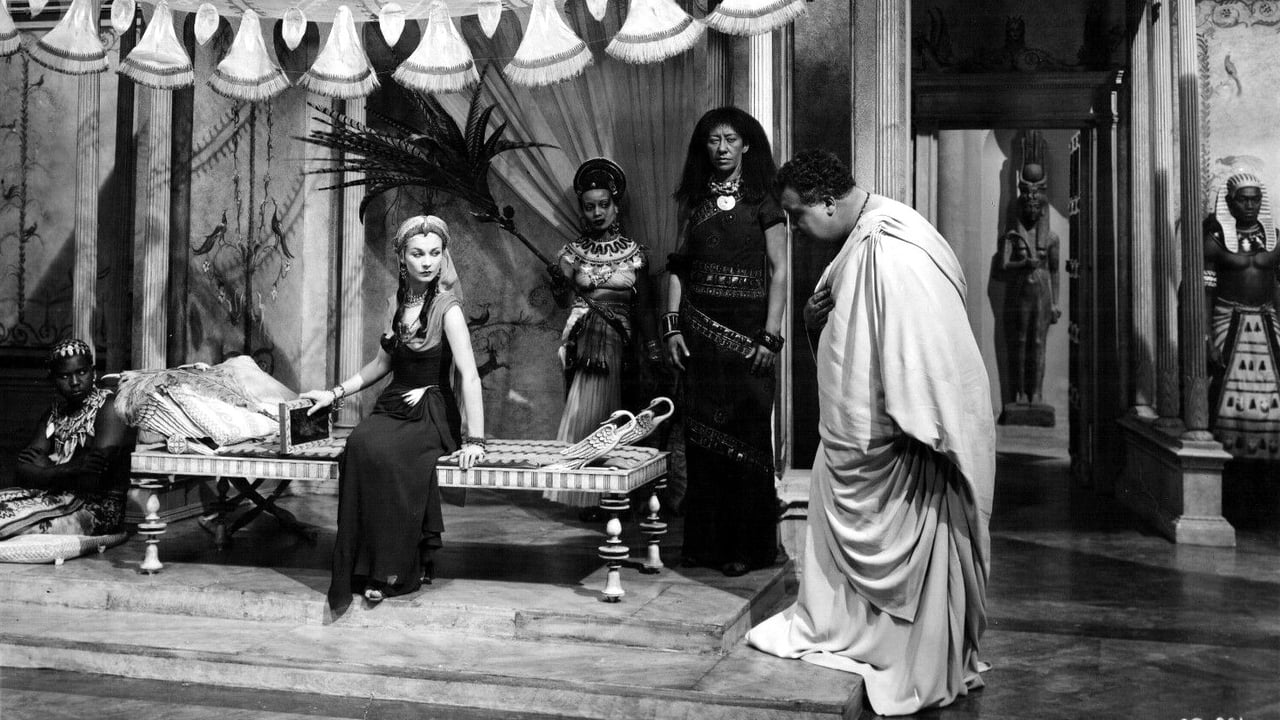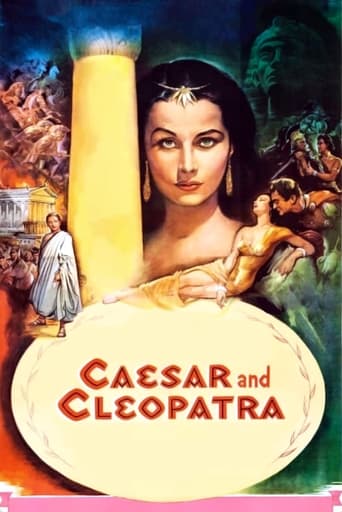Titreenp
SERIOUSLY. This is what the crap Hollywood still puts out?
Raetsonwe
Redundant and unnecessary.
CrawlerChunky
In truth, there is barely enough story here to make a film.
Kaydan Christian
A terrific literary drama and character piece that shows how the process of creating art can be seen differently by those doing it and those looking at it from the outside.
JohnHowardReid
Although "Caesar and Cleopatra" has this fantastic reputation as the British Cinema's most expensive flop, all this talk about a financial disaster is simply not borne out by the figures. (The Motion Picture Guide even repeats this myth, alleging "a then staggering loss of $3 million"). Allowing an extremely generous estimate of print and distribution costs, the most that would have been lost on first release would be £70,000 — and this would surely have been earned back in the 1948 re-issue alone. In fact, by 1950 the movie was firmly in the black. Since that time, non-theatrical, including TV and video sales have produced windfall profits for the Rank Organisation. But it suited Rank at the time to cry foul. He had no love for Pascal. Or Shaw either. He didn't like being put on the spot when he was forced to bail them out. And it suited him to make "Caesar and Cleopatra" the scapegoat and a cover- up for the enormous losses sustained on movies he did heartily endorse like "Blanche Fury" and "Esther Waters".As for the movie itself, unfortunately Rains is forced to carry it virtually single-handed. Leigh is patently too old for the role — though she looks great in her opening scene. Whoever photographed that was a master of illusion. Alas, the other three cinematographers can't match him. On many later occasions, Miss Leigh is definitely not flattered at all. True, her health declined during production, but no efforts are made to disguise her often ravaged face. Her acting too seems to have fallen away with her beauty.One thing you can say though is that all the money spent on the movie is right up there on the screen, not squandered on inflated star salaries or wasted on half-shot and then abandoned footage. The sets are truly breathtaking, so impressive and expressive as to make the scenery in the Liz Taylor "Cleopatra" seem garish, disorganized and second-rate. Full marks to Bryan and Messel for such dazzling and beguiling triumphs of artistry. A pity neither the script in particular nor the performances in general seem worthy of such visual magnificence.Fortunately, the superb ITV DVD manages the seemingly impossible. On the small screen, everyone comes out with honor – except Vivien Leigh, for whom the color restoration is considerably less than kind, and Flora Robson who not only tends to over-act but seems unsure how to play her role. Is she a comic character or a very sinister one? Shaw, of course, would like to have it both ways, but a subtle actor who has read the script would play the comedy with not just an overdose of asperity but with an intimation of evil. Hard to do, I'll admit, but that's what real acting is all about.Stewart Granger has the right idea. He plays his role tongue-in- cheek. A pity some of his dash and vigor didn't rub off on Claude Rains who is far too solemn for a Shavian hero. Rains is admittedly an adequate Caesar but he lacks the dash he brought to "Casablanca".
Robert J. Maxwell
You're liable to get the impression from the first couple of scenes that this is stagy and maybe without too much point. Claude Raines as the newly arrived conqueror meets Vivien Leigh as the air-headed tittering adolescent Cleopatra in front of the Sphinx and under the Egyptian stars. It's all very cute.Well, it remains stagy. After all, it's a play. But it's hardly pointless. Raines remains the man he first appears, rather gentle, bearing the weight of the world on his shoulders, good-natured, able to suffer some twitting, stern but fair, endearingly sensitive about being middle aged and losing his hair.But Cleopatra -- wow! When she meets Raines, Vivien Leigh is wraith like and pale and imperiously beautiful without actually knowing it. At first, she's just a kid, jealous of her husband, who is her younger brother, who rules Egypt as Ptolemy -- or at least he did, until Raines takes the reins. But Leigh's character evolves. Her childishness, her giggling and choking on tears, is at first an aspect of her inner nature but later becomes a tactical ploy used deliberately in disarming enemies. She turns pretty clever, and not in a good way. Her whimsy turns to murder. She enchants Raines, but Raines is no fool. He treats her like a slightly reckless daughter until, after she has a rival assassinated, he dresses her down. But in the end he sails away, leaving her in the hands of his Executive Officer, and promising to send her a handsome younger man named Marc Antony.Aside from "Pygmalion," I was never able to get WITH George Bernard Shaw, whose play this is. The two or three of his plays that I've seen seemed preachy and discursive. But if you get past the opening, this one is pretty good. Of course, Shaw being the rational moralist he was, it's about more than Caesar and Cleopatra and who's going to rule Egypt.Cecil Parker is Caesar's worried slave and first-hand man, Brittanus, "an Islander," meaning he's from Britain and worships the Druids or something. Shaw has a good time with him, poking fun at his homeland. Well, I guess Shaw was Irish, but identified more with Britain. Parker's Brit is a mostly comic figure who can't swim. He's aghast when he is asked to leave Cleopatra with a man, unattended by a chaperon. "Shocked!", he exclaims, in a tone copyrighted by Claude Raines a few years earlier in "Casablanca." But then, later, someone asks Raines, "What, is Caesar in despair?" And Raines replies, "He who has never hoped cannot despair," which either Albert Camus ripped off from Shaw, or independently invented. Kids -- don't try to apply that maxim at home. I did, and it doesn't work.What a cast! Almost everybody who was anybody is in this thing in parts small or large. Stewart Granger is present as the tall, dark, handsome, Sicilian Apollodorus. He's the only person in the film with an evident sun tan and wardrobe has him decked out in embarrassingly brief garments. Stanley Holloway goes almost unnoticed as a Roman soldier with, I think, one line. (He was a sublime grave digger two years later in Olivier's "Hamlet.") Too many other familiar names to list, though I should mention that I think I glimpsed a chubby teen-aged Jean Simmons as a harp player who had no lines at all. If her movie career had stopped at this point, mine would have been better than hers. I had a dozen parts with no lines at all.All of those performances, by the way, are quite good, even if they seem a little hammy at times, as if this were a filmed play and the actors were trying for the balcony. The sets are both stylized and stylish.And it's both amusing and dramatic without being in the least preachy.
arieliondotcom
The first few minutes are dry and dull but suddenly the sun comes out with the appearance of Leigh. Granted, I'm infatuated with her but I don't think anyone else could deny the sparkle and power of her presence in this film as, though in her thirties in real life, she becomes a teenage girl just beginning to experience her sexuality and the power it has over men. In those scenes where Raines acts with her, he reflects her and shines, too, and the picture takes on a light air. And there are patches of British style humor. But in those rather long stretches where GBS indulges himself in dialogue where he fancies himself to be Shakespeare (and Shakespeare he ain't!) it is dry torture, like licking a pyramid.So watch it. To deny yourself seeing Leigh even in her few, spotty scenes of sunlight would be like denying yourself a picnic because of intermittent Raines.
Panamint
Observe Claude Rains' soliloquy at the Sphinx near the beginning of this film. His amazing voice and graceful delivery of the words prove once again why he is increasingly becoming more respected as one of the major actors of the 20th Century. Just watch and you will see that I am not exaggerating. Rains' outstanding performance is the chief reason that this film holds together and deserves your viewing time.Vivien Leigh is not Scarlett O'Hara here. I don't mean that in a negative way, its just that her life and career are in transition at this point. She is more mature, and her voice is obviously affected by cigarettes or by the tuberculosis that she was suffering from that year, and she appears pale and fragile at times. I mention this because it is significant, as she is forced to try to bring some of her once-youthful "Scarlett" and "Lady Hamilton" girlish liveliness to the early scenes but only barely succeeds. Later, through sheer acting ability she admirably begins to project a regal presence as the film progresses. Maybe not the best Cleopatra on film, but overall she is certainly more than adequate.The supporting cast is excellent although they are sometimes directed rather sloppily, as though maybe the production was rushed. The overall production seems odd to me because it is done as if it is simply the stage play on film, taking place mostly in a palace at Alexandria. Also, some heavy themes are played lightly or even frivolously at times. I am a bit puzzled about what style they were going for.Having seen this film several times I am always impressed by George Auric's theme music and scoring, but always the poor sound recording almost spoils its effect. Hopefully someday a reconstructed score or maybe a restoration or enhancement of this original soundtrack will be presented with the film.You must admire the obvious hard work and effort that Rains and Leigh contributed to this movie. Overall, if you view this movie primarily for Claude Rains' performance but don't expect a lot more out of it you won't be disappointed.

